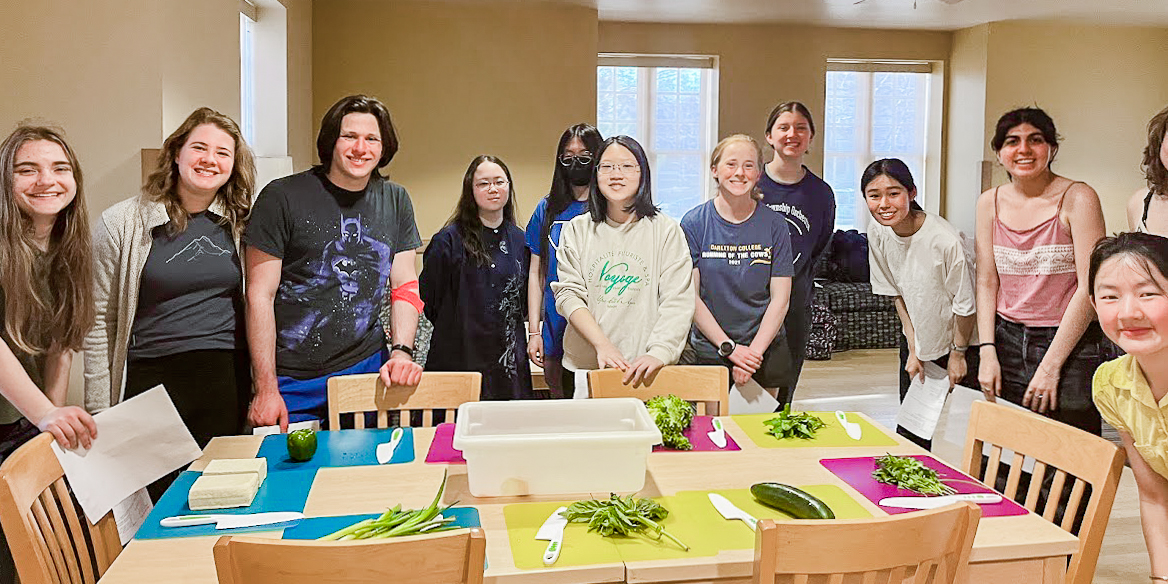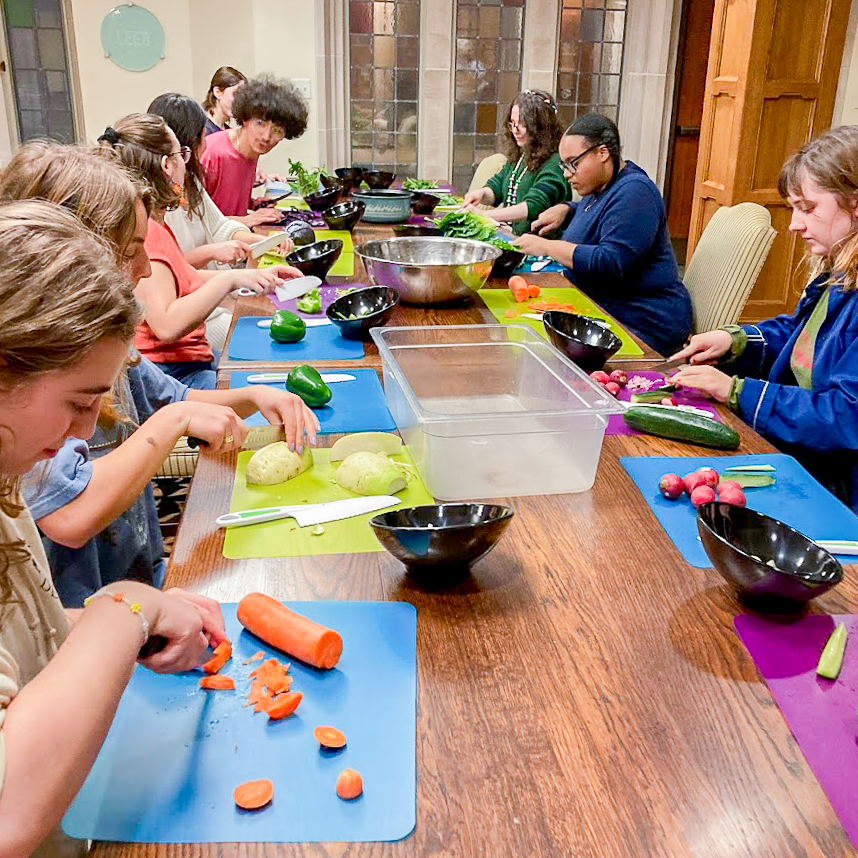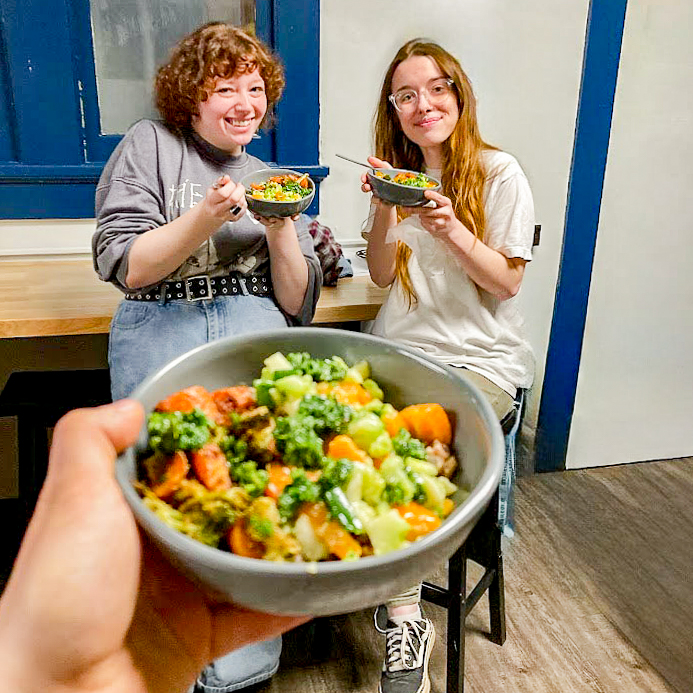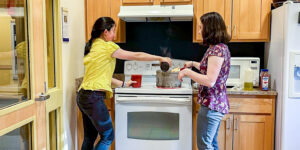It’s a Plant-Based Party! Fellows Bring Vegetable Inspiration to College Residence Hall Kitchens
- by Elise Kulers

Members of Environmental Carls Organized (ECO) pose during their plant-based cooking demonstration, led by Fellow Elise Kulers
Across the country, Bon Appétit teams have been hard at work paving the way for a plant-forward revolution. The Bon Appétit Fellows have embarked on a similar mission to spread inspiration and knowledge about how to cook with vegetables through a series of plant-based cooking demonstrations for college students.
While students on Bon Appétit campuses get to enjoy the delicious plant-powered creations of Bon Appétit chefs in their cafés, the Fellows are committed to empowering cooking class participants to explore the range of plant-based foods that are easy on the budget but still packed with flavor and nutrients.
The classes provide practical life skills, too. College students will soon to be graduates and independent home cooks in a world where plant-based diets are expected to be the growing norm. The EAT-Lancet Commission, a renowned group of experts in food, health, and sustainability, estimates that global consumption of fruits, vegetables, nuts, and legumes will have to double (while red meat and sugar consumption will need to be cut in half) to secure a sustainable future.
During my campus visits this past spring, I connected with dozens of students to celebrate accessible vegetable-centered recipes in the best way I know how: with a plant-based party! Alongside student organizations, we hosted a range of interactive cooking demonstrations in communal residence hall kitchens across the Midwest, Southeast, and beyond.

Rhodes College Sustainability Coalition, Beekeeping Club, and Roots Campus Garden members slice up ingredients
At Rhodes College in Memphis, Tennessee, I was joined by the Sustainability Coalition, Beekeeping Club, and Roots Campus Garden members to explore the versatility of plant-based ingredients. Using one set of simple ingredients— an array of fresh vegetables, tofu, herbs, and a homemade salty-sweet sunbutter sesame soy sauce— we made two distinct dorm-friendly recipes. (Sunbutter is a seed butter made from sunflower seeds.)
First, we made a vegan spin on Vietnamese spring rolls, where we wrapped our fresh, raw ingredients in hydrated rice paper (Bánh tráng) served with our savory dipping sauce. For our second recipe, we tossed rice noodles in the glossy sunbutter sauce and served it with baked Sriracha tofu, sliced vegetables, and topped the dish with fresh herbs.
The demo sparked not only cooking inspiration but also hopes for future cross-campus collaboration. Sustainability Coalition president Claire McElwain remarked, “I loved the freshness of everything, using mostly raw vegetables to create something so flavorful. Once we sat down to eat, it inspired conversations about what we want to see happen on campus and in our community and working more with Bon Appétit in the future to bring those ideas to fruition.”

Underutilized plant parts like carrot tops and broccoli stems were transformed into a delicious grain bowl at St. Mary-of-the-Woods College
Our next stop is near Terre Haute, Indiana at St. Mary-of-the-Woods College, where I joined forces with the Sustainability Club to celebrate Stop Food Waste Day. Because many people aren’t aware of the potential of underutilized plant parts like carrot tops and broccoli stems, we focused on celebrating the whole vegetable, stem to root, with a delectable grain bowl.
Not only does cooking with the whole plant prevent unnecessary waste, but it also stretches valuable grocery dollars and encourages creativity in the kitchen. While we roasted carrots and broccoli florets in the Le Fer Hall dorm kitchen, we transformed hand-chopped carrot tops into a vibrant chimichurri and diced broccoli stems, then tossed them with bell peppers and ginger into an Asian-inspired slaw. (Fun fact: did you know carrots are in the parsley family and broccoli is in the cabbage family?)
We enjoyed all our various vegetable components together over a bed of farro and lentils for a luxurious zero waste meal. As residents passed by the kitchen, we encouraged them to try our creation —everyone was shocked to learn that the tasty meal contained vegetable scraps that are ordinarily thrown away, proving that the flavor stands up to their more commonly-eaten counterparts.

A member of Environmental Carls Organized (ECO) cooks with Fellow Elise Kulers (right)
Last but not least, my travels brought me to Carleton College in Northfield, Minnesota, where I connected with Environmental Carls Organized (ECO) to make a spiced sweet potato black bean chili. After sautéing our aromatics and blooming our spices, we threw in the rest of our ingredients, many of which are common pantry staples: crushed tomatoes, black beans, cubed sweet potatoes, hot and sweet peppers, and the secret ingredient that make all the other elements shine (freshly squeezed orange juice— trust me on this one!).
While our chili simmered away on the stove, we pivoted to a completely different recipe genre, spending our time chopping vegetables and herbs for a fresh spring roll appetizer, a perfect interlude while we waited on our main course. Once the chili was deeply aromatic and the sweet potatoes were cooked through, we stirred in kale leaves and corn kernels to add some final pizzazz. As any fan of chili will know, the toppings are the best part: we crowned our homemade creation with vegan cheese, sliced scallions, hot sauce, and diced avocado.
The 15 participants filled up their bowls and we all ate outside to catch the remaining sunshine on a gorgeous spring day. During the meal, we chatted about where to find plant-forward recipes, how to build flavor and exciting textures using vegetables, and our favorite plant-based foods.
Underlying our conversation of all the cooking demos I’d hosted this past semester was the reminder of the power of food. It’s the “single strongest lever to optimize human health and environmental sustainability on Earth,” according to the EAT-Lancet commission. A daunting but energizing charge. What better place to start than in the kitchen?